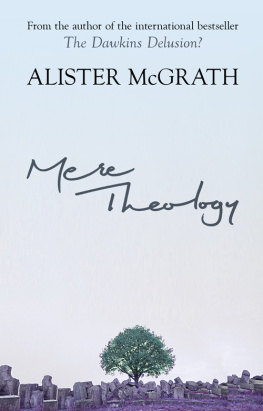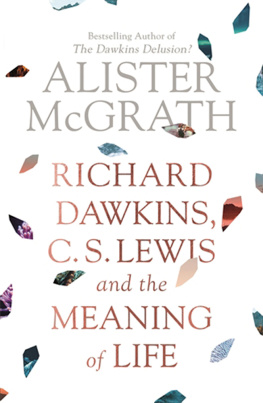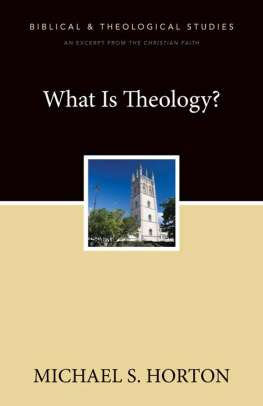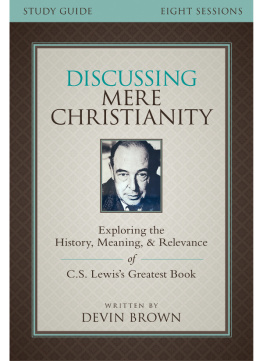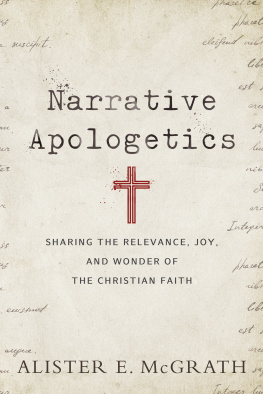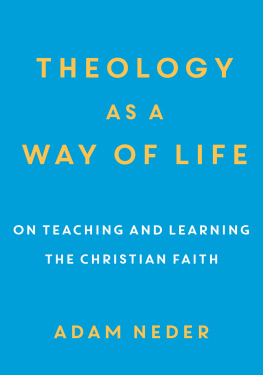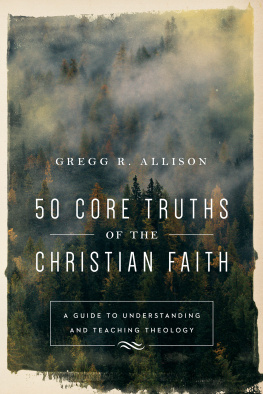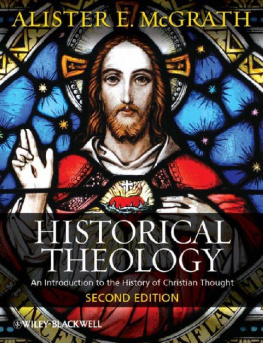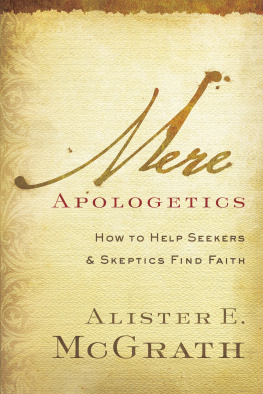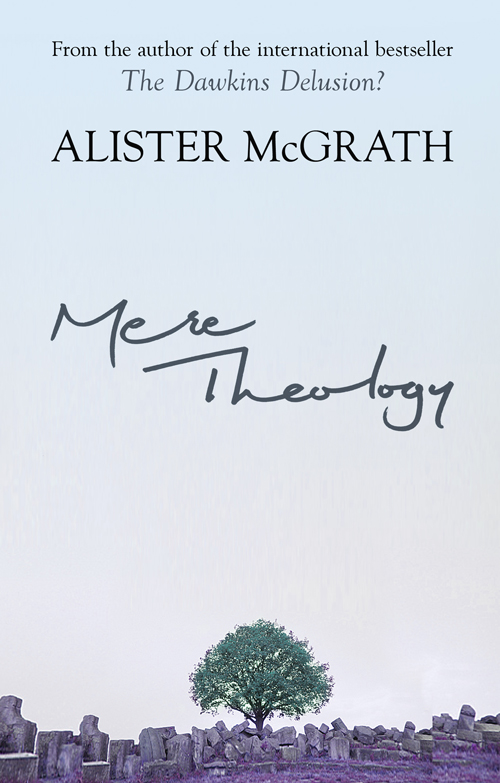
First published in Great Britain in 2010
Society for Promoting Christian Knowledge
36 Causton Street
London SW1P 4ST
www.spckpublishing.co.uk
Copyright Alister McGrath 2010
All rights reserved. No part of this book may be reproduced or transmitted in any form or by any means, electronic or mechanical, including photocopying, recording, or by any information storage and retrieval system, without permission in writing from the publisher.
SPCK does not necessarily endorse the individual views contained in its publications.
The author and publisher have made every effort to ensure that the external website and email addresses included in this book are correct and up to date at the time of going to press. The author and publisher are not responsible for the content, quality or continuing accessibility of the sites.
Unless otherwise noted, Scripture quotations are taken from the New Revised Standard Version of the Bible, copyright 1989 by the Division of Christian Education of the National Council of the Churches of Christ in the USA. Used by permission. All rights reserved.
Scripture quotations taken from the HOLY BIBLE, NEW INTERNATIONAL VERSION. Copyright 1973, 1978, 1984 by International Bible Society. Used by permission of Hodder & Stoughton Publishers, a member of the Hachette UK Group. All rights reserved. NIV is a registered trademark of International Bible Society. UK trademark number 1448790.
British Library Cataloguing-in-Publication Data
A catalogue record for this book is available from the British Library.
ISBN 9780281062096
E-ISBN 9780281064991
Typeset by Kenneth Burnley, Wirral, Cheshire
First printed in Great Britain by Ashford Colour Press
Subsequently digitally printed in Great Britain
Produced on paper from sustainable forests
eBook by Graphicraft Ltd, Hong Kong
Contents

Part 1
THE PURPOSE, PLACE AND RELEVANCE OF CHRISTIAN THEOLOGY
Part 2
ENGAGING WITH OUR CULTURE

Christian theology is one of the most intellectually stimulating and exciting subjects it is possible to study, rich in resources for the life of faith and the ministry of the Church. This book may be seen both as an intellectual defence of the place of theology in the Christian life, and as a plea for the Christian Church to take the life of the mind seriously, especially in the light of contemporary public debates.
This book is about mere theology, a phrase which I have shamelessly borrowed and adapted from C. S. Lewiss famous notion of Mere Christianity. By mere theology, I mean the basic themes that have characterized the Christian vision of reality down the ages. This book does not defend or advocate any particular school or style of theology, but rather sets out to explore how the great tradition of Christian theological reflection enriches our faith and deepens our engagement with the concerns and debates of the world around us. While Lewis is a well-known representative of this approach, it extends far beyond (and behind) him. All too often, theology merely generates controversy and factionalism within the Church. My concern here is to focus on the positive role of theology in shaping, nourishing and safeguarding the Christian vision of reality, and applying it to the challenges and opportunities that Christians face today.
It may be helpful if I set this book in context. The last couple of years have been very significant in my life, both in terms of events and scholarship. After exactly 25 years service to the Faculty of Theology at Oxford University, I took up the newly established Chair of Theology, Ministry and Education at Kings College London in September 2008. Kings College was founded by King George IV and the Duke of Wellington in 1829 to encourage a creative interaction between the academy, Church and society, and has a long tradition of fostering theological engagement and reflection. Although I am an academic theologian, I have always believed that theology is at its best when it generates reflective practices in the life and service of the Church. The new London chair was set up to encourage a direct engagement between theology and the life of the Church, and I count myself deeply privileged to be its first occupant.
Earlier in 2008, I gave the Riddell Memorial Lectures at the University of Newcastle-upon-Tyne, exploring how the new way of seeing things made possible by the Christian faith leads to a revitalization of our engagement with nature. These lectures in effect represented a manifesto for a new style of natural theology, firmly grounded in the Christian tradition. Some of the themes of these lectures are echoed in this book.
Yet the book as a whole reflects a wider cultural background. In 2006, the movement now widely, if inaccurately, known as the new atheism exploded on the cultural scene. Richard Dawkins The God Delusion (2006), Daniel Dennetts Breaking the Spell (2006), and Christopher Hitchens God Is Not Great (2007) created a media fascination with religion and its discontents. Public interest in the God-question soared. I found myself regularly being called upon to speak and write on these themes, and debate with leading atheists in public: Richard Dawkins in Oxford, Daniel Dennett in London, and Christopher Hitchens in Washington. Although I much prefer seminar rooms to debating chambers, there is no doubt that the issues being contested were a matter of general, not just academic, interest. To my surprise, I found that I had become a public intellectual.
Debate often centred on the rationality of faith, and the coherence of the Christian vision of reality. For the new atheists, Christianity represents an antiquated way of explaining things that can be pensioned off in the modern scientific age. In one of the wonderfully unsubstantiated assertions that make up so much of his case against religion, Christopher Hitchens tells us that, since the invention of the telescope and microscope, religion no longer offers an explanation of anything important. Its a nice soundbite which, when placed alongside many other equally unsubstantiated soundbites, almost manages to create the semblance of an evidence-based argument. But is it anything more than that?
In his brilliantly argued critique of the new atheism, Terry Eagleton ridicules those who treat religion as a purely explanatory entity. Christianity was never meant to be an explanation of anything in the first place. Its rather like saying that thanks to the electric toaster, we can forget about Chekhov. Believing that religion is a botched attempt to explain the world is on the same intellectual level as seeing ballet as a botched attempt to run for a bus.
Eagleton is surely right here. There is far more to Christianity than an attempt to make sense of things. The New Testament is primarily concerned with the transformation of human existence through the life, death and resurrection of Jesus of Nazareth. The gospel is thus not so much about explanation as about salvation the transformation of the human situation. Yet while the emphasis of the Christian proclamation may not be on explaining the world, it nevertheless also offers a distinctive way of looking at things which, at least in principle, enables us to see those things in different ways, and thus leads us to act in ways consistent with this. Christianity involves believing that certain things are true, that they may be relied upon, and that they illuminate our perceptions, decisions and actions. These themes are essential to mere theology, and they feature prominently in this manifesto for the reasonableness of faith.

